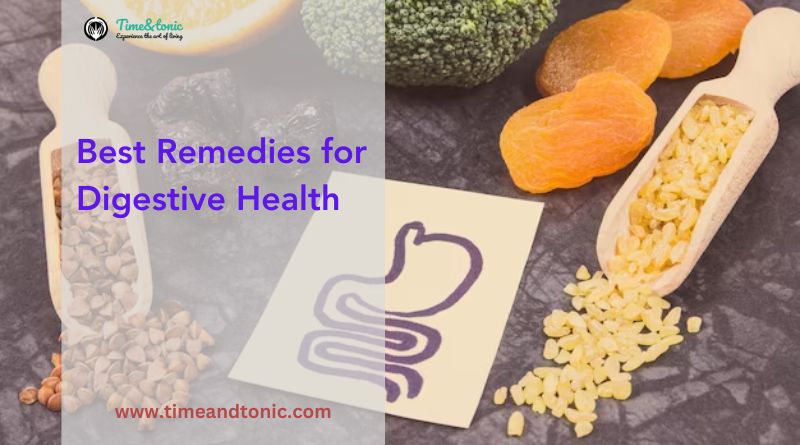10 Best Remedies for Digestive Health
Best Remedies for Digestive Health – In the intricate tapestry of overall well-being, few threads are as vital as digestive health. A harmonious digestive system not only ensures the smooth processing of nutrients but also serves as a cornerstone for our entire physical and mental wellness. Yet, the modern lifestyle often challenges this delicate balance, leading to a surge in digestive issues that impact our daily lives profoundly.
Welcome to our comprehensive guide on the Best Remedies for Digestive Health. In the pages that follow, we delve deep into the realm of digestive well-being, exploring the intricate workings of the digestive system and shedding light on the most effective remedies that nature and science have to offer.
Whether you’re seeking relief from occasional discomfort, aiming to fortify your gut health preventively, or dealing with chronic digestive disorders, this guide is tailored for you. We will navigate the realms of balanced nutrition, herbal remedies, lifestyle changes, and cutting-edge supplements, offering you a roadmap to optimal digestive vitality.
Embark on this journey with us as we unravel the secrets to a healthier, happier gut – your gateway to a more vibrant life.
Digestive Health
Digestive health refers to the efficient functioning of the digestive system, which includes the organs, enzymes, hormones, bacteria, and other substances involved in the digestion and absorption of food, as well as the elimination of waste products from the body. A healthy digestive system ensures that the body receives essential nutrients from the food we consume while effectively eliminating waste and toxins.
The significance of digestive health cannot be overstated, as it plays a crucial role in maintaining overall well-being. Here are several key aspects of its significance:
- Nutrient Absorption: Digestive health is vital for breaking down food into nutrients (such as proteins, carbohydrates, fats, vitamins, and minerals) that the body can absorb and utilize. These nutrients are essential for energy production, growth, and repair of cells and tissues.
- Immune System Support: A significant portion of the body’s immune system is located in the digestive tract. A healthy gut helps prevent harmful substances from entering the bloodstream, reducing the risk of infections and supporting the body’s immune defenses.
- Mood and Mental Health: The gut-brain connection demonstrates the strong link between the digestive system and mental health. A balanced gut microbiome (the community of bacteria in the digestive tract) is associated with a lower risk of mental health disorders, including anxiety and depression.
- Prevention of Digestive Disorders: Maintaining digestive health reduces the risk of various digestive disorders such as constipation, diarrhea, irritable bowel syndrome (IBS), and inflammatory bowel diseases (IBD) like Crohn’s disease and ulcerative colitis.
- Energy and Vitality: A well-functioning digestive system ensures efficient energy production, making individuals feel more energetic and vital throughout the day.
Also Read: Nourishing Low Carb Dinners for Vibrant Living
The Role of Diet in Digestive Health
The role of diet in digestive health is pivotal; what we consume directly influences the efficiency of our digestive system. A well-balanced and nutritious diet provides the necessary fuel for the body, supports the growth and maintenance of beneficial gut bacteria, and ensures the smooth functioning of the entire digestive process. Here’s a detailed look at how diet plays a crucial role in promoting digestive health:
1. Fiber-Rich Foods:
- Importance: Dietary fiber, found in fruits, vegetables, whole grains, and legumes, adds bulk to the stool, preventing constipation. It also promotes regular bowel movements, reducing the risk of digestive disorders.
- Impact: Adequate fiber intake softens the stool, making it easier to pass, which alleviates constipation. Additionally, fiber acts as a prebiotic, nourishing beneficial gut bacteria, fostering a healthy gut microbiome.
2. Probiotic-Rich Foods:
- Importance: Probiotics are live bacteria and yeasts beneficial for gut health. They maintain the balance of harmful and beneficial bacteria in the intestines, promoting a healthy digestive system.
- Impact: Consuming probiotic-rich foods such as yogurt, kefir, kimchi, and sauerkraut introduces beneficial bacteria into the gut. These probiotics aid in digestion, enhance nutrient absorption, and bolster the immune system.
3. Hydration:
- Importance: Proper hydration is essential for digestion. Water helps dissolve waste particles and aids in the smooth movement of food through the digestive tract.
- Impact: Drinking an adequate amount of water ensures that the digestive system functions efficiently. It softens the stool, preventing constipation, and supports the overall digestion and absorption of nutrients.
4. Moderation and Balanced Nutrition:
- Importance: Consuming a balanced diet that includes proteins, carbohydrates, healthy fats, vitamins, and minerals is essential for overall health, including digestive health.
- Impact: Avoiding excessive consumption of processed foods, high-fat foods, and sugary snacks helps in preventing digestive issues like acid reflux and indigestion. Instead, focusing on whole foods ensures a steady supply of essential nutrients for optimal digestive function.
5. Avoiding Trigger Foods:
- Importance: Certain foods, like spicy foods, citrus fruits, and caffeine, can trigger digestive problems in susceptible individuals.
- Impact: Identifying and avoiding trigger foods helps in managing conditions like acid reflux, IBS, and other gastrointestinal disorders. It reduces discomfort and promotes a healthier digestive system.
Also Read: Low Carb Midnight Snacks
Best Remedies for Digestive Health
Maintaining digestive health is fundamental for overall well-being. Incorporating natural remedies into your lifestyle can significantly improve your digestive system’s function. Here are the best remedies for digestive health, encompassing dietary adjustments, lifestyle changes, and herbal solutions:
1. Digestive Enzyme Supplements

Digestive enzyme supplements are a valuable aid for those struggling with digestive issues. These supplements contain specific enzymes that assist the body in breaking down complex food compounds, improving nutrient absorption and reducing discomfort. For individuals with conditions like lactose intolerance or pancreatic insufficiency, where the body lacks certain enzymes, these supplements are particularly beneficial.
By taking digestive enzyme supplements before meals, individuals can experience relief from bloating, gas, and indigestion. They play a vital role in promoting efficient digestion, ensuring that the body extracts maximum nutrition from the food we consume, leading to better overall health and vitality.
2. Probiotics
Probiotics are living yeasts and bacteria that are good for your health in many ways, especially for your digestive system. Found naturally in fermented foods like yogurt, kefir, and kimchi, or available in supplement form, probiotics play a crucial role in maintaining a balanced gut microbiome. By promoting the growth of beneficial bacteria in the intestines, probiotics aid in digestion, strengthen the immune system, and prevent the overgrowth of harmful bacteria.
They also alleviate common digestive issues like diarrhea, constipation, and irritable bowel syndrome. Probiotics are increasingly recognized for their positive impact on overall well-being, supporting not just digestive health but also immune function and mental wellness.
3. Herbal Remedies
Herbal remedies offer natural and time-tested solutions for various digestive issues. Plants like ginger, peppermint, and chamomile have potent medicinal properties that soothe the digestive tract, reducing inflammation and easing discomfort. Ginger, renowned for its anti-inflammatory effects, relieves nausea and aids digestion.
Peppermint relaxes the muscles of the gastrointestinal system, alleviating symptoms of indigestion and irritable bowel syndrome. Chamomile possesses gentle yet effective calming properties, reducing gas and bloating. Herbal teas, tinctures, or supplements made from these herbs provide gentle relief from digestive ailments, making them popular choices for those seeking holistic, plant-based remedies for their digestive health concerns.
4. Fiber-Rich Diet
A fiber-rich diet is the cornerstone of good digestive health. Found abundantly in fruits, vegetables, whole grains, and legumes, dietary fiber offers numerous benefits. Its ability to add bulk to stool promotes regular bowel movements, preventing constipation. Moreover, fiber acts as a prebiotic, nourishing beneficial gut bacteria essential for a balanced microbiome.
By softening stools and aiding their passage through the digestive tract, fiber reduces the risk of diverticulosis and hemorrhoids. Additionally, it helps in managing weight by inducing a feeling of fullness. Incorporating a variety of fiber-rich foods into one’s diet not only supports optimal digestion but also contributes to overall well-being and long-term health.
5. Stay Hydrated

Staying hydrated is fundamental for a healthy digestive system. Water is essential for almost every function in the body, including digestion. Proper hydration ensures the smooth movement of food through the digestive tract, preventing constipation and promoting regular bowel movements. It also makes chairs softer, which makes them easier to go.
Water aids in the digestion and absorption of nutrients, facilitating the breaking down of food particles. Dehydration can lead to various digestive issues, including indigestion and gastric discomfort. By drinking an adequate amount of water daily, individuals support their digestive processes, ensuring efficient nutrient absorption and overall gut health.
6. Mindful Eating
Mindful eating is a transformative practice that nurtures a healthy relationship with food and significantly influences digestive well-being. It involves being fully present while eating, focusing on the sensory experience, taste, and texture of each bite. By slowing down and paying attention to hunger and fullness cues, individuals naturally avoid overeating, promoting better digestion.
Mindful eating encourages a profound connection with the body’s signals, preventing digestive discomfort like bloating and indigestion. Additionally, it enhances gratitude for food, fostering a positive attitude towards nourishment. By embracing mindful eating, people not only savor their meals but also support their digestive system, leading to improved overall health and a balanced approach to nutrition.
7. Regular Exercise
Regular exercise is not only vital for physical fitness but also plays a significant role in maintaining a healthy digestive system. Engaging in consistent physical activity enhances digestion by promoting regular bowel movements and preventing constipation. Exercise stimulates the muscles in the gastrointestinal tract, aiding in the smooth passage of food through the digestive system.
It also reduces the risk of developing digestive disorders such as irritable bowel syndrome (IBS) and improves overall gut motility. Furthermore, regular exercise helps manage stress, a common trigger for digestive issues, by releasing endorphins, which contribute to a healthier gut-brain connection. Embracing physical activity as a routine contributes immensely to optimal digestive health.
8. Manage Stress
Managing stress is pivotal for a healthy digestive system and overall well-being. Chronic stress disrupts the natural balance of the digestive tract, leading to issues like indigestion, bloating, and even more severe conditions like irritable bowel syndrome (IBS). Stress triggers the release of hormones like cortisol, which can affect gut motility and lead to inflammation.
Techniques such as meditation, deep breathing exercises, yoga, and mindfulness not only alleviate stress but also promote relaxation in the digestive organs. By incorporating stress-management practices into daily life, individuals can create a harmonious balance between the mind and body, fostering a healthier, more resilient digestive system.
9. Avoid Trigger Foods
Avoiding trigger foods is a crucial strategy for maintaining a healthy digestive system. Certain foods, such as spicy dishes, fatty meals, caffeine, and dairy products, can irritate the digestive tract and exacerbate conditions like acid reflux, gastritis, or irritable bowel syndrome (IBS). By identifying and eliminating these trigger foods, individuals can prevent uncomfortable symptoms like heartburn, bloating, and stomach cramps.
Keeping a food diary and observing how specific foods affect digestion can help pinpoint triggers. Adopting a diet free from these irritants ensures a more comfortable digestive experience, allowing individuals to enjoy meals without the worry of subsequent discomfort, promoting overall gut health and well-being.
10. Consult a Healthcare Professional

When digestive issues persist or worsen, consulting a healthcare professional is paramount. Persistent symptoms like chronic abdominal pain, blood in stool, unexplained weight loss, or prolonged diarrhea may indicate underlying health conditions such as gastrointestinal infections, inflammatory bowel diseases, or even gastrointestinal cancers. Timely medical intervention is essential for accurate diagnosis and tailored treatment plans.
Healthcare professionals can conduct comprehensive evaluations, including physical exams and diagnostic tests like endoscopies or imaging studies, to identify the root cause of the problem. Their expertise ensures proper management, alleviating discomfort, and preventing complications, guaranteeing individuals the best possible digestive health and peace of mind.
Also Read: 9 Best Grocery Store Finds
In conclusion, prioritising digestive health through mindful eating, hydration, exercise, and avoiding trigger foods is vital. Incorporating remedies like digestive enzyme supplements, probiotics, herbal solutions, and a fibre-rich diet enhances overall well-being. Remember, individual responses vary, so consulting a healthcare professional for persistent issues is essential. By embracing these practices and seeking expert guidance when needed, one can cultivate a healthy digestive system, ensuring a life of comfort, vitality, and holistic wellness.
FAQs
Absolutely. Probiotics are live beneficial bacteria that promote a balanced gut microbiome, aiding digestion, enhancing nutrient absorption, and boosting the immune system. They’re found in fermented foods or supplements.
Ginger and peppermint have natural anti-inflammatory properties, soothing the digestive tract, relieving indigestion, and reducing bloating. They can be consumed as teas, infusions, or supplements.




